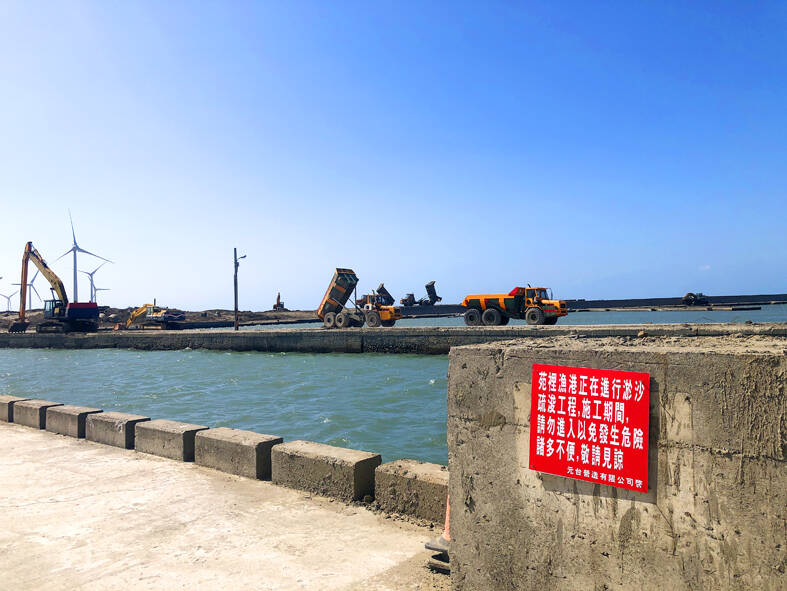The Trust in Nature Foundation yesterday called for a comprehensive coastline protection policy after finding that Taiwan’s coastlines are threatened by artificial structures that cause excessive erosion.
The foundation began surveying the nation’s coasts ten years ago and identified nine priority areas. After returning this year, it found that only 23.3 percent of the sites within these protected areas remained free of human-made objects.
The original survey documented 383 locations across 15 counties and cities, highlighting issues such as marine waste, artificial coastlines and improper recreational activities, said Chen Tzu-jung (陳姿蓉), director of the foundation’s environmental issues department.

Photo courtesy of the Trust in Nature Foundation
Nine priority coasts were selected for protection at the time, which were revisited this year to determine how the situation has changed and to provide policy recommendations, Chen added.
The new survey covered 103 of the original locations and 300km of coastline, Chen said.
The nine selected areas were reefs in Taoyuan’s Guanyin District (觀音), Taoyuan’s Caota Sand Dunes (草漯沙丘), Yuanli (苑裡) beach in Miaoli County, Sishu (喜樹) to Shuangchun (雙春) in Tainan, Changhua County’s coastal wetlands, Manfeng (滿豐) to Nanren (南仁) Fishing Harbor (南仁漁港) in Pingtung County, Jhuan Village (竹安) to Nanao Township (南澳) in Yilan County, Shiti Harbor (石梯港) in Hualien County to Changbin Township (長濱) in Taitung County and the coast between Nanren Fishing Port in Pingtung and Nantian Village (南田) in Taitung County.
The new survey found that across these nine priority locations, only 23.3 percent were natural coastlines without artificial structures. By comparison, 37.9 percent of the selected sites were affected by concrete installations such as wave-dissipating blocks, seawalls and fishing ports; 35 percent were used for transportation and recreational facilities and 3.9 percent were occupied by green energy facilities.
Wave-dissipating blocks were traditionally used to mitigate erosion, but recent studies show that they can actually make the problem worse, project manager Chou No-heng (周諾恆)said.
The blocks also require costly maintenance, Chou said, adding that people should instead seek to reduce damage to coastlines by using more ecological methods, such as offshore reefs.
Threats to the coasts cannot be solved solely through community monitoring or a pause on development, and the government should work with the public to create a future with no coastline loss, foundation director Sun Hsiu-ju (孫秀如) said.
Stagnation is regression, so although these coastlines remained mostly the same, there was also no improvement, Sun said.
The government should do a full review of the Coastal Management Act (海岸管理法) across all of its agencies, Sun said.
Different government agencies are doing different things: Some are restoring coastlines, while others, along with private entities, are causing damage, Chou said.
Authorities should establish professional auditing and accreditation standards for coastal structures, Chou added.

The inspection equipment and data transmission system for new robotic dogs that Taipei is planning to use for sidewalk patrols were developed by a Taiwanese company, the city’s New Construction Office said today, dismissing concerns that the China-made robots could pose a security risk. The city is bringing in smart robotic dogs to help with sidewalk inspections, Taipei Deputy Mayor Lee Ssu-chuan (李四川) said on Facebook. Equipped with a panoramic surveillance system, the robots would be able to automatically flag problems and easily navigate narrow sidewalks, making inspections faster and more accurate, Lee said. By collecting more accurate data, they would help Taipei

STATS: Taiwan’s average life expectancy of 80.77 years was lower than that of Japan, Singapore and South Korea, but higher than in China, Malaysia and Indonesia Taiwan’s average life expectancy last year increased to 80.77 years, but was still not back to its pre-COVID-19 pandemic peak of 81.32 years in 2020, the Ministry of the Interior said yesterday. The average life expectancy last year increased the 0.54 years from 2023, the ministry said in a statement. For men and women, the average life expectancy last year was 77.42 years and 84.30 years respectively, up 0.48 years and 0.56 years from the previous year. Taiwan’s average life expectancy peaked at 81.32 years in 2020, as the nation was relatively unaffected by the pandemic that year. The metric

TAKING STOCK: The USMC is rebuilding a once-abandoned airfield in Palau to support large-scale ground operations as China’s missile range grows, Naval News reported The US Marine Corps (USMC) is considering new sites for stockpiling equipment in the West Pacific to harden military supply chains and enhance mobility across the Indo-Pacific region, US-based Naval News reported on Saturday. The proposed sites in Palau — one of Taiwan’s diplomatic allies — and Australia would enable a “rapid standup of stored equipment within a year” of the program’s approval, the report said, citing documents published by the USMC last month. In Palau, the service is rebuilding a formerly abandoned World War II-era airfield and establishing ancillary structures to support large-scale ground operations “as China’s missile range and magazine

Passengers on Taiwan High Speed Rail (THSR) will be required to use headphones and make phone calls in gangways under new “quiet travel” rules starting Sept. 22. THSR Chairman Shih Che (史哲) told media that THSR will run a three-month promotional campaign to ensure widespread adoption of the new rules. Those repeatedly ignoring the guidance face the potential termination of their transport contract, which can result in them getting escorted off the train, according to THSR. Shih shared his hope to cultivate an environment conducive to rest and reading for the train’s passengers, stating that these changes aim to “promote self-discipline” among passengers